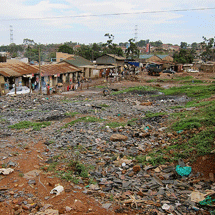This article was first published 2 September 2011 on sdinet.org.
By Ariana K. MacPherson and Charlton Ziervogel, SDI Secretariat

|
|
Eviction site in Kisenyi, Kampala, Uganda. Photo: SDI |
[6 September 2011] -- The machine of urbanisation rolls on. Each year thousands upon thousands of individuals make the move away from rural areas to seek a better life in the city. But what waits in the city is no easy street to riches, but rather a fight for limited space on land that is scarce and valuable.
The rural poor make their way to the city only to become the urban poor, and instead of the open arms of opportunity, they slip through the cracks, forced to eke out an existence in the realm of the informal. They are branded illegal, part of a temporary problem that needs to be eradicated. The truth of the matter is that many slum dwellers have been living in the city, working in the city, raising families in the city, for just as long as their “formal” urban counterparts.
Bordering the main road in Kisenyi, Uganda, is an open swath of land, riddled with debris. It is the site of a recent eviction. Hundreds of families were forced out of their homes, their shacks razed to the ground. The remnants of life, chained in by barbed wire. This is the daily threat, and harsh reality, of informal living. Centrally located settlements like Kisenyi sit on some of the city’s most valuable land, “The gold of Kampala, the real gold of Kampala,” says one member of the Ugandan SDI Alliance. He is right. Urban land is scarce, and only becoming scarcer.
This same scene plays itself out in Accra, Cape Town, Harare, Kampala and Nairobi. Slums in these five cities make up some of the largest in the world. Old Fadama in Accra, the N2 settlements in Cape Town, Mbare in Harare, Kisenyi in Kampala and Mukuru in Nairobi are home to many of Africa’s poorest people, living in overcrowded, insecure conditions without access to toilets or clean drinking water and under increasing threat of eviction from ever ready bulldozers hungry for land. At its core, the issue is one of exclusion. The urban poor have been excluded from their right to the city for decades, and as cities grow, the right to urban land becomes increasingly contested between those with access to power and money, and those without.
By asserting their place at the city’s core, residents of informal settlements are made part of the face and a voice of the city, and are given space to engage with local government. Many of these communities have been residing in cities for decades, and yet they remain largely excluded from the city’s formal systems and services. It is time that the officials and politicians recognise this fact. The urban poor are not nameless, placeless masses to be uprooted and moved to the periphery. Their communities, families, livelihoods and social networks are in the city. Eviction, displacement, and relocation to the urban periphery only result in further fragmentation of society, reinforcing the divisions of race and class that have existed for centuries.
What is at stake is more than just providing homes to the homeless, it is about placing people at the center of the urbanisation process, ensuring that the city is not just for those with power and wealth. It is about allowing for recognition of those who have actively contributed to the city’s economy, calling it home for years, yet continue to be denied full citizenship.
In recent years, SDI Alliances have begun the necessary move towards incremental, in situ slum upgrading in centrally located informal settlements across the Global South, linking pragmatic survival strategies with rights-based struggles for inclusive cities. Federations of the urban poor across Africa, Asia and Latin America have begun to find ways to make meaningful contributions to the creation of inclusive cities, effectively securing their livelihoods and homes in the face of power, money and greed.
To catalyse these efforts, SDI has selected five focus cities in Africa – Accra, Cape Town, Harare, Kampala and Nairobi – to be home to long-term, precedent-setting pilot projects that provide people-driven, incremental upgrading for housing and basic services such as water, sanitation, drainage, road access, and waste collection. The hope is that this process will give urban poor federations the necessary backing to build partnerships with government officials and leverage government resources in order to bring these projects to scale, counteracting the constant threat of removal and providing steps towards security of tenure to the urban poor.
There is no doubt that the global population is in the throngs of a revolutionary shift towards the urban; the question that remains to be answered is what gives certain people more of a right than others to call the urban sphere their home. If the urban poor are placed at the centre of this global process of urbanisation instead of land values, capital investments and how to turn the biggest profit, a start can be made to redress one of the biggest failures of the modern era: the use of urban space as an exclusionary tool instead of an opportunity to create vibrant, integrated communities.




